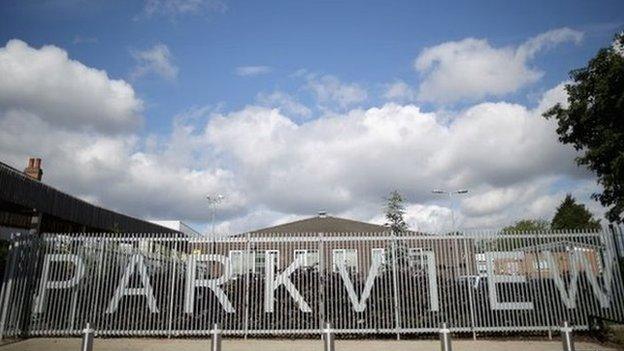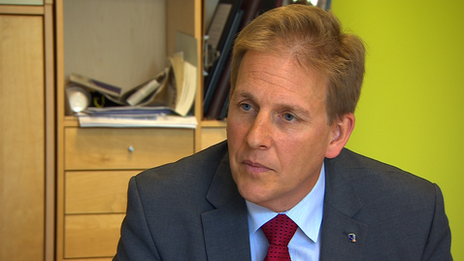Headteacher: Trojan Horse internal review 'farcical'
- Published
Tim Boyes, head of Queensbridge School, said he had warned ministers
A review of the Education Department's handling of concerns about extremism in schools is "farcical", a Birmingham headteacher has told the BBC.
The review said there were "no instances... where specific 'warnings' were ignored" or where officials or ministers acted "inappropriately".
But Queensbridge School head Tim Boyes said the department "did absolutely nothing because it's a thorny policy".
Mr Boyes met a minister twice in 2010 to discuss his concerns.
'Unreasonable'
He said the second meeting included a presentation to the minister, Lord Hill, about concerns that Muslim hardliners were trying to take control of Birmingham schools.
The meeting was held three years before a letter - now widely assumed to be a forgery - alleging a "Trojan Horse" plot was sent to Birmingham council.
The review, written by the DfE's top civil servant, Chris Wormald, said the department was contacted six times about matters relating to potential extremist infiltration in Birmingham schools between 1994 and 2013.
It acknowledged the meetings between Lord Hill and Mr Boyes took place but denied any action was expected in response.
"None of the attendees at the meeting expected there to be follow up on Birmingham-specific issues", it said.
"A suggestion was made at the end of the second meeting for a further discussion with a wider group of headteachers. This suggestion is referenced in the note of the meeting, but not as a specific action with a named individual charged with taking it forward. The further meeting did not take place."
Mr Boyes said the suggestion that no action was expected to happen was "unreasonable".
Off the hook
"It's farcical that central government can dodge responsibility when it wants to, that ministers feel that such stark warnings could be ignored and neither immediate action nor policy change needs to take place.
"Because I didn't say 'You must intervene in this way', they are letting themselves off the hook. As a headteacher without jurisdiction to make decisions about what to do next, I don't know what more I can do than lay out a clearly evidenced picture."
Lord Hill left the second meeting before it ended. Mr Boyes said Elena Narozanski, a special adviser to Michael Gove at the time, then led the meeting.
"She was the person who at the end of the meeting, in a one-to-one with me, said 'The Secretary of State would be personally particularly interested; would I please bring a group to talk to him?'
"Why not pay any reference to that in the report? She asked if I would come to a meeting, she presented to me that Michael Gove would like to hear what I'd told Lord Hill. She was asserting he would want to hear more about this, but I never heard anything."
The review said the presentation featured "largely anonymised case studies" and the discussion concerned "general policy".
"The fact that the minister followed up the initial concerns with a wider policy discussion with the relevant officials and advisers seems a reasonable step to have taken", it said.
"The briefing provided for the minister for the second meeting did not go into detail about the issues of extremism in schools."
Mr Boyes said he did discuss extremism, although not specifically violent extremism, alongside specific concerns.
"The case studies were anonymised because other heads had given me permission to tell stories but hadn't wanted their names mentioned. Where I had licence to, names were not anonymised and we talked specifics about particular names and schools.
"I went into a room [where] people acknowledged something needs to happen. The assumption it didn't because I didn't tell them what to do, is unreasonable."
- Published16 January 2015

- Published28 May 2014
